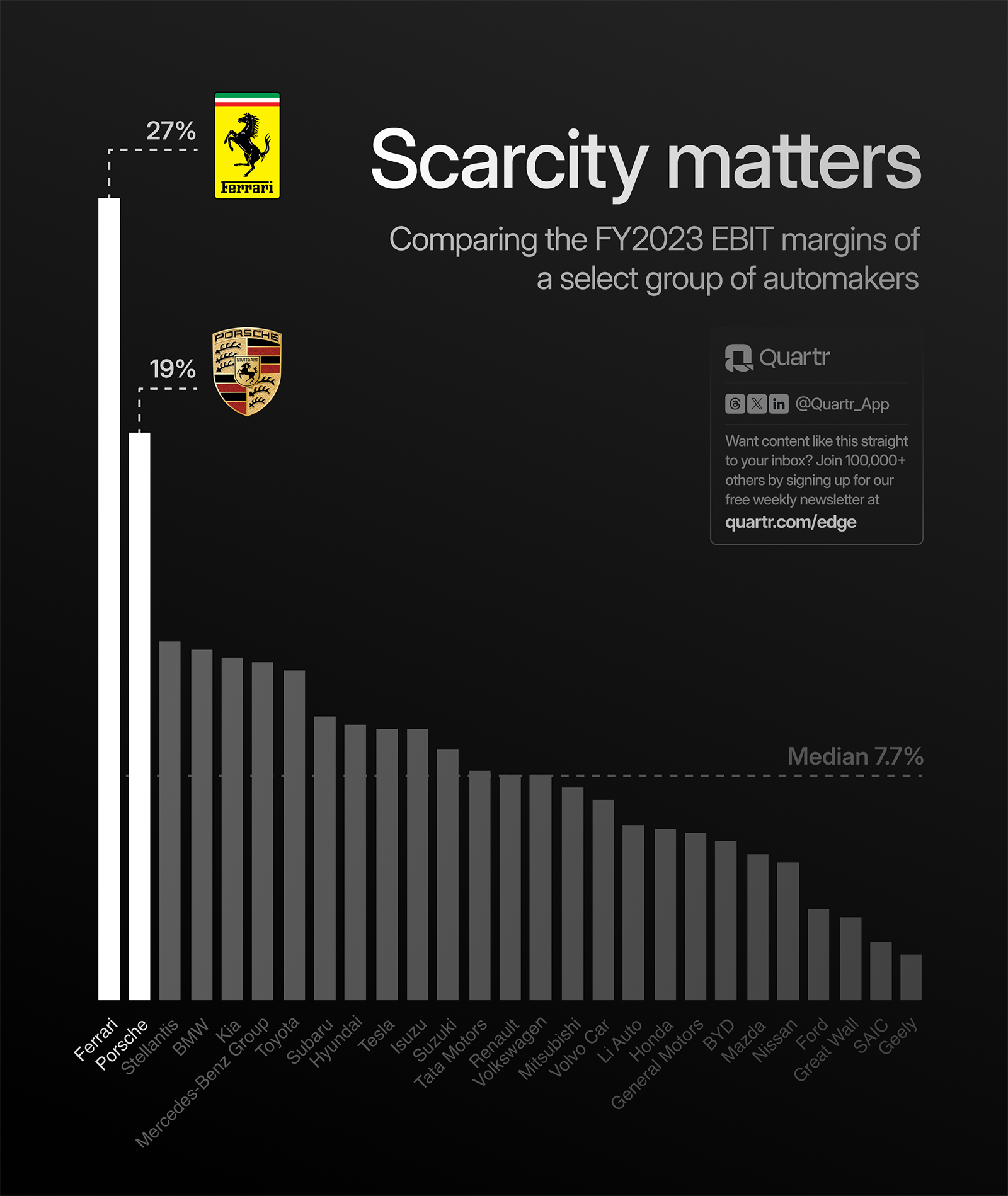The China Factor: Analyzing Market Difficulties For BMW, Porsche, And Other Automakers

Table of Contents
The Chinese automotive market, once a beacon of rapid growth and immense opportunity for global giants like BMW and Porsche, is now presenting significant challenges. This article delves into the complexities of the "China factor," examining the key difficulties faced by international automakers vying for a piece of this lucrative but increasingly competitive market. Understanding these obstacles is crucial for navigating the future of automotive sales in the world's largest car market. The China auto market challenges are multifaceted and require a nuanced approach to overcome.
Intensified Domestic Competition
The rise of powerful domestic brands and the complexities of joint ventures represent significant hurdles for international automakers in China.
Rise of Domestic Brands
Chinese automakers are rapidly challenging established international players. This is fueled by:
- Strong government support: Subsidies, tax breaks, and infrastructure development initiatives bolster domestic brands.
- Rapid technological advancements: Chinese companies are making significant strides in EV technology, autonomous driving, and connected car features, quickly closing the gap with global leaders.
- Aggressive pricing strategies: Competitive pricing often undercuts international brands, particularly in the rapidly expanding EV segment.
- Focus on domestic consumer preferences: A deep understanding of local tastes and preferences allows Chinese brands to better tailor their offerings.
Several Chinese brands, such as BYD, NIO, and Xpeng, are prime examples of this success. BYD, for instance, has become a global leader in electric vehicle sales, leveraging its vertically integrated supply chain and innovative battery technology to undercut competitors on price and performance. NIO and Xpeng have successfully carved out niches by focusing on premium EVs and sophisticated digital features. These companies' market share gains highlight the increasing pressure on international players.
Joint Venture Challenges
Joint ventures are common in the Chinese auto market, but they present unique complexities:
- Negotiating equitable partnerships: Balancing the interests of international and domestic partners can be challenging.
- Balancing technological transfer with preserving proprietary knowledge: Sharing technology is often a requirement, but protecting intellectual property is paramount.
- Adapting to shifting regulatory landscapes: The Chinese automotive regulatory environment is dynamic, requiring constant adaptation.
Many international automakers have experienced both successes and setbacks in their joint ventures. The ability to effectively navigate these partnerships, while preserving technological advantage and adapting to changes in the regulatory environment, is key to success in the Chinese market. Failures to properly manage these relationships can lead to significant losses of market share and profitability.
Shifting Consumer Preferences and Expectations
The Chinese automotive market is not only becoming more competitive but also rapidly changing in terms of consumer demands.
Demand for Electric Vehicles (EVs)
China is at the forefront of the global EV revolution.
- Rapid adoption of EVs: Government incentives and increasing environmental awareness are driving strong demand for EVs.
- Government incentives for electric vehicles: Substantial subsidies and tax breaks are accelerating EV adoption.
- Development and charging infrastructure needs: The rapid expansion of EV charging infrastructure is crucial to support growth.
- Consumer preference for technological advancement in EVs: Features such as advanced battery technology and autonomous driving capabilities are highly valued.
The Chinese government's strong push towards electrification presents both an opportunity and a challenge. Automakers must invest heavily in EV technology and infrastructure to remain competitive. Failure to adapt to this rapid shift could lead to significant market share losses.
Focus on Digitalization and Connectivity
Chinese consumers expect a high level of digital integration in their vehicles.
- Integration of digital ecosystems: Seamless connectivity with popular Chinese apps and services is vital.
- Demand for advanced driver-assistance systems (ADAS): Features like lane keeping assist and adaptive cruise control are highly sought after.
- Data privacy concerns: Addressing data security and privacy concerns is essential to build consumer trust.
- Software updates and over-the-air (OTA) functionalities: Regular software updates and OTA features are expected to enhance the vehicle's functionality and lifespan.
Digitalization is transforming the customer experience. Automakers need to invest in software development, data analytics, and cybersecurity to meet these evolving expectations. This requires a shift from a traditional hardware-focused approach to a more software-defined vehicle strategy.
Regulatory Hurdles and Geopolitical Factors
Navigating the regulatory environment and geopolitical landscape is crucial for success in the Chinese automotive market.
Stringent Emission Standards
China's commitment to environmental protection is reflected in its stringent emission regulations.
- Meeting stringent emission targets: Compliance requires substantial investment in cleaner technologies.
- Adapting to constantly evolving regulations: The regulatory landscape is dynamic, requiring continuous adaptation.
- Penalties for non-compliance: Strict penalties for non-compliance can significantly impact profitability.
- Long-term investment in clean energy technologies: A long-term commitment to clean energy technologies is essential for sustainability.
Meeting these standards requires significant upfront investment and ongoing commitment to technological innovation. Companies failing to comply risk facing substantial fines and reputational damage.
Geopolitical Uncertainties
Geopolitical factors introduce uncertainty into the Chinese automotive market.
- Trade wars: Trade tensions can disrupt supply chains and impact market access.
- Supply chain disruptions: Geopolitical instability can lead to disruptions in the supply of critical components.
- Political instability: Unpredictable political developments can impact business operations.
- Intellectual property protection: Protecting intellectual property rights in China is a significant concern.
These uncertainties can significantly impact the stability and predictability of the Chinese auto market. Companies need to develop resilient supply chains and carefully manage their exposure to geopolitical risks.
Conclusion
The "China factor" presents a complex interplay of domestic competition, evolving consumer preferences, and regulatory hurdles. International automakers like BMW and Porsche must adapt swiftly to navigate these challenges. Successfully competing in the Chinese market requires a deep understanding of local dynamics, significant investment in R&D, particularly in EV technology and digitalization, and a flexible approach to joint ventures and regulatory compliance. Ignoring the complexities of the China auto market challenges could lead to significant setbacks. To thrive, international automakers need to proactively address these issues and embrace a long-term strategy tailored to the unique demands of the Chinese automotive landscape. Proactive planning and strategic adaptation are key to overcoming the China factor and securing a future share of this dynamic and rapidly evolving market. Understanding and effectively addressing these China auto market challenges is paramount for long-term success.

Featured Posts
-
 Champ Season Approaching Stadium Track Gets A Makeover
May 11, 2025
Champ Season Approaching Stadium Track Gets A Makeover
May 11, 2025 -
 Zurich Classic Salinda And Velo Set The Pace With Record Setting Round
May 11, 2025
Zurich Classic Salinda And Velo Set The Pace With Record Setting Round
May 11, 2025 -
 Is The Cbs Vma Simulcast A Sign Of Mtvs Decline
May 11, 2025
Is The Cbs Vma Simulcast A Sign Of Mtvs Decline
May 11, 2025 -
 The Teen Mom Effect Farrah Abrahams Rise And Fall
May 11, 2025
The Teen Mom Effect Farrah Abrahams Rise And Fall
May 11, 2025 -
 City Name Mi A Comprehensive Guide For College Students
May 11, 2025
City Name Mi A Comprehensive Guide For College Students
May 11, 2025
